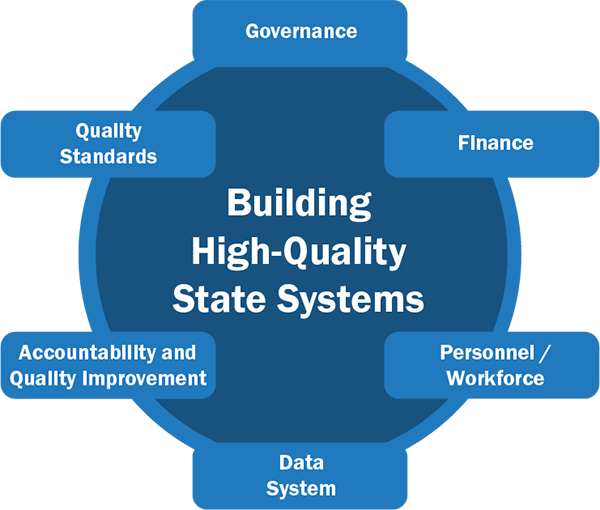Finance
Topic Editor: Katy McCullough
katy.mccullough@unc.eduAn adequate, stable funding base is required to insure effective and responsive systems of services and supports for young children with or at-risk of disabilities and their families. Resources from the national, state, and community levels must be combined to support these systems of early intervention and preschool services. Careful attention needs to be given when assembling or modifying such an interagency funding system.
System planners and program administrators face challenges in understanding and using these resources, combining them for the benefit of children and families, and fully funding their systems of services and supports. This topical section provides information on funding resources, tools to aid in combining as many of these resources as necessary in states and communities, and the specific financing provisions for Part C and Part B, Section 619 systems, legislation and regulations.
Each state's Part C Lead Agency is responsible for carrying out general administration and supervision of the Early Intervention (EI) system. A toolkit on Part C Fiscal Monitoring Indicators for State Lead Agencies is available to help fiscal monitoring indicators for their specific contexts.
See also: Inclusion: Financing Strategies and Collaborative Funding
U.S. Department of Education, IDEA: Resources for Grantees on Fiscal
Congress appropriates IDEA funds intended to support early intervention, special education, and related services for infants, toddlers, children, and youth with disabilities and their families. These resources for grantees provide information on OSEP's Fiscal Implementation Team (FIT), IDEA fiscal requirements, uniform guidance requirements, EDGAR requirements, excess costs, fiscal monitoring, MOE, prior approval requests, and fedeal fiscal guidance.
ECTA System Framework: Finance Component

A strong, fiscally sound system that is sustainable overtime is driven by a finance planning process that is in alignment with a larger system or state-level strategic plan to meet program infrastructure and service delivery needs, both for the short and long-term.
This component includes:
- Finance planning process/forecasting
- Fiscal data; procurement
- Resource allocation
- Use of funds and disbursement
- Monitoring and accountability of funds and resources
DaSy Critical Questions: Local Early Intervention Services (EIS) Program- and Local Education Agencies (LEA)-Level Questions (2015)
The Center for IDEA Early Childhood Data Systems (DaSy) compiled a set of Critical Questions that a quality state data system for early intervention (EI) or early childhood special education (ECSE) should provide the data to answer. Critical questions for a high-quality statewide data system specific to funding and expenditures (see: Section 3.C.) include:
- What is the cost of providing early intervention/early childhood special education (EI/ECSE) services to children and families?
- Does the state have sufficient revenue to provide quality IDEA services?
- How can the state maximize efficiency in the operation of the early intervention/early childhood special education (EI/ECSE) program (for example, by changing practices and reallocating resources) and maintain or improve outcomes?
Pay for Success (PFS) (2016)
An innovative financing mechanism that harnesses private capital to fund evidence-based prevention-focused programs or social services.
